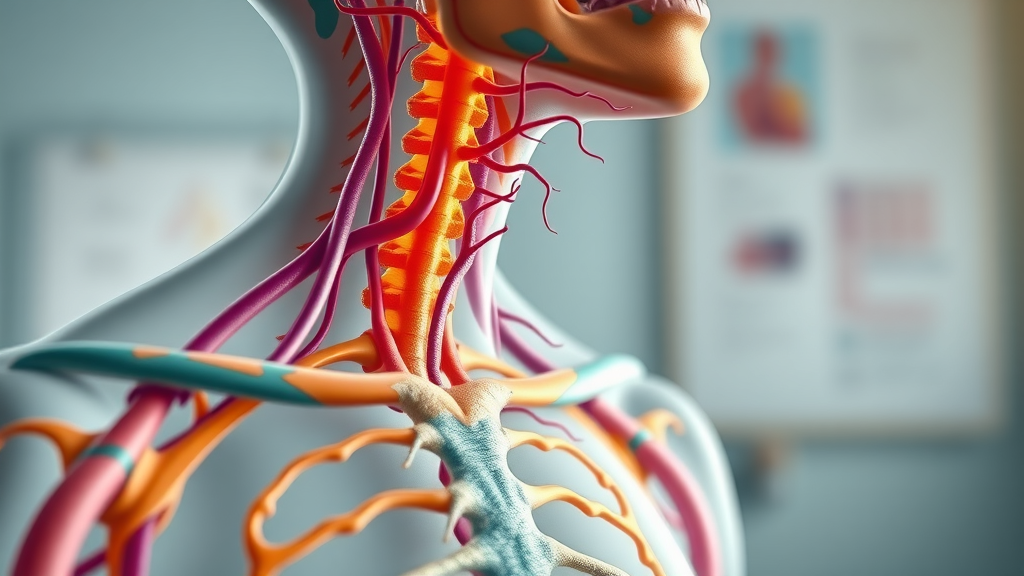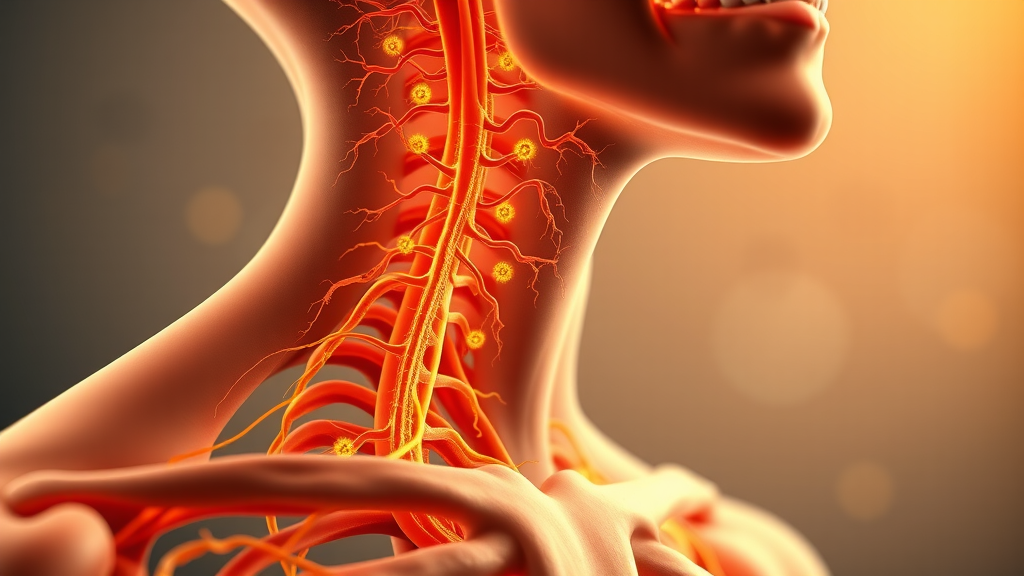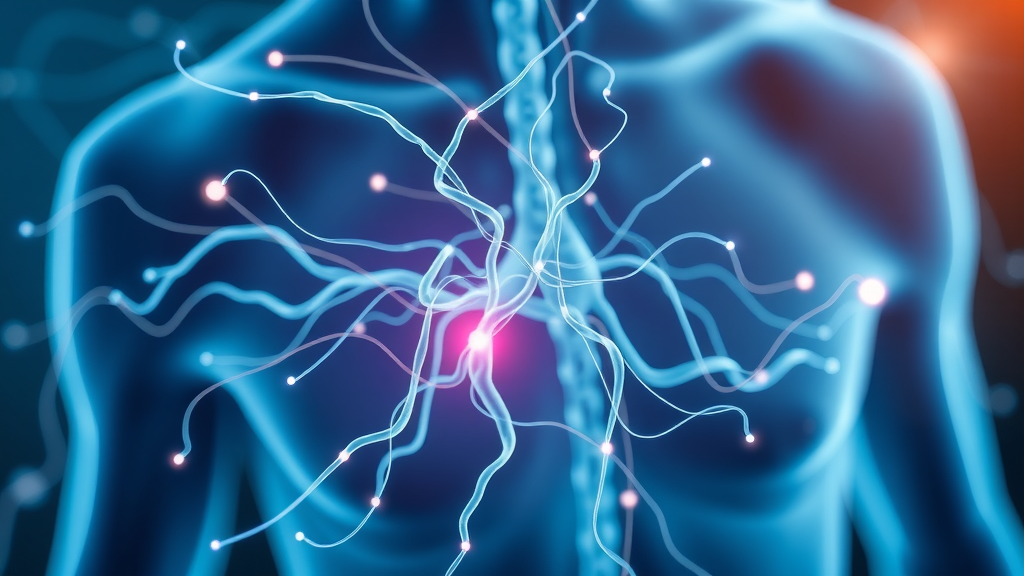In a world where stress and anxiety seem to reign, understanding the vagus nerve importance can be a game-changer for your well-being.
Often dubbed the body's wandering nerve, it plays a crucial role in regulating our emotions, heart rate, and digestion.
By mastering the intricacies of this fascinating nerve, you can unlock powerful tools for stress management and emotional resilience.
Join us as we delve into the wonders of the vagus nerve, revealing how this often-overlooked pathway can transform your health and enhance your daily life.
Overview of the Vagus Nerve Importance
Anatomy and Function of the Vagus Nerve
The vagus nerve is the longest cranial nerve in the human body. Originating in the brainstem, it travels down through the neck and branches out to numerous organs, including the heart, lungs, and digestive tract.
Its extensive network allows it to mediate a vast array of physiological functions, including heart rate, digestion, and the body's response to stress.
As explained by Stefan Chmelik, a traditional Chinese medicine physician, “the vagus nerve has been part of mammalian evolution for over 800 million years and plays a critical part in regulating our physiological responses” (Chmelik).
This nerve not only affects basic physical functions but is also intricately linked to our emotional well-being. Research continues to reveal its substantial role in regulating mood and anxiety levels, making its significance paramount in both mental and physical health.

The Role of the Vagus Nerve in Emotional Regulation
A robust vagus nerve importance lies in its connection to emotional regulation. It directly influences the parasympathetic nervous system, which is responsible for the "rest and digest" state of our body.
This component helps to calm our physiological responses during times of anxiety and stress.
As Chmelik points out, “feeling safe is ground zero” for emotional well-being. This underlines how critical the vagus nerve is for fostering a sense of safety and relaxation in the body, which in turn supports higher-level functions such as emotional processing and interpersonal engagement.
The Vagus Nerve's Impact on Bodily Functions
Connection to the Autonomic Nervous System
The vagus nerve is a principal conduit of the autonomic nervous system, which orchestrates involuntary bodily functions.
It contrasts with the sympathetic nervous system, which initiates the fight-or-flight response.
Through vagal tone, the body can regulate heart rate, blood pressure, and digestive functions, facilitating a state of relaxation and restoration.
According to Chmelik, the vagus nerve connects internal and external experiences, influencing how we process information and respond to stressors.
This highlights the nervous system's dynamic nature and the importance of vagal health in maintaining homeostasis.
Influence on Heart Rate and Digestion
By controlling heart rate and digestion, the vagus nerve plays an essential role in overall health.
When stimulated appropriately, it can lead to lower heart rhythms and improved digestive processes.
This interaction between the vagus nerve and bodily functions illustrates its vital contribution to the vagus nerve importance .

Expert Insights on Vagus Nerve Toning
Methods for Toning the Vagus Nerve
To enhance vagal tone, various methods can be employed. Practices such as deep breathing, meditation, and specific sound frequencies can stimulate the vagus nerve effectively.
As Chmelik notes, “toning the vagus nerve is about encouraging a system to become stronger, more flexible, and more resilient” (Chmelik).
These techniques not only require a commitment to practice but also encourage individuals to develop a deeper connection with their physiological and emotional states.
The Role of Sound and Vibration
Sound and vibration have emerged as effective modalities for toning the vagus nerve. The use of devices like Sensate employs infrasound resonance to assist in stimulating vagal activity without the need for conscious mental effort.
As Chmelik explains, this approach taps into the body's natural resonating capabilities, creating a soothing effect that can be immensely beneficial in reducing stress and anxiety levels.
“Toning the vagus nerve is about encouraging a system to become stronger, more flexible, and more resilient.” - Stefan Chmelik
Common Misconceptions about the Vagus Nerve
Debunking Myths Surrounding Vagal Stimulation
There are several misconceptions about the vagus nerve and its stimulation. One common myth is that vagal stimulation can only be achieved through invasive medical procedures.
However, less invasive methods, like breathing techniques and sound-based therapies, provide effective alternatives that are accessible to many.
Understanding Vagal Overstimulation
Overstimulation of the vagus nerve can also lead to discomfort and adverse effects. Symptoms may include dizziness or fainting, particularly in cases of extreme vagal stimulation.
Understanding these nuances enhances awareness and empowers individuals to approach vagal toning with care.

Practical Applications of Vagus Nerve Toning
Breath Control Techniques
Breathing techniques are invaluable for enhancing vagus nerve importance . Practices such as diaphragmatic breathing not only promote relaxation but also directly influence vagal tone. As Chmelik highlights, breath is the one autonomic function we can control consciously.
Using Devices for Vagal Toning
Modern technology has introduced various devices designed to assist with vagal toning, such as Sensate.
Designed to be user-friendly, these devices provide an effective means to engage with the vagus nerve through sound and vibration, proving beneficial for those seeking relief from anxiety and stress.
“Breath is perhaps the only autonomic function that we can easily exert influence over.” - Andrew Weil, MD
People Also Ask
Why is the vagus nerve the most important?
The vagus nerve is crucial for regulating multiple bodily functions, such as heart rate, digestion, and emotional responses, linking mental and physical health.
What happens if the vagus nerve is damaged?
Damage to the vagus nerve can lead to a range of symptoms, including digestive issues, abnormal heart rate, and disturbances in emotional stability.
What happens when the vagus nerve is overstimulated?
Overstimulation may cause unexpected symptoms such as fainting, dizziness, and digestive distress, emphasizing the need for balanced vagal engagement.
Can we live without the vagus nerve?
While survival without the vagus nerve is technically possible, it would severely impair many autonomic functions, resulting in serious health complications.
Key Takeaways
The Importance of the Vagus Nerve in Health
The vagus nerve importance cannot be overstated. It plays an integral role in managing stress, emotional regulation, and many key bodily functions. Understanding this can empower individuals to take charge of their wellness.
Methods to Enhance Vagal Tone
Utilizing sound and vibration through devices
Engaging in breath control exercises
Incorporating restorative practices such as meditation and yoga
Conclusion
Final Thoughts on Vagus Nerve Importance
In summary, the vagus nerve serves as a critical link between our mental and physical health.
By understanding its anatomy and functions—as well as the various methods for toning it—we can significantly enhance our overall well-being.
As we navigate a world filled with stressors, nurturing our vagal tone will be instrumental in fostering resilience and balance.

Explore More About Vagus Nerve Health
Unlock the full potential of your physical and emotional health by discovering more about the vagus nerve importance . Explore resources, methods, and expert insights to enhance your vagal tone and improve your overall quality of life.
 Add Row
Add Row  Add
Add 




 Add Row
Add Row  Add
Add
Write A Comment